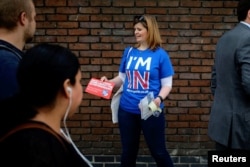Future trade with the European Union is a major issue as British voters decide this month whether their country should remain in the bloc, and there are concerns about the future of the U.S. trade relationship, Britain's most important.
Opponents of a Brexit, a British exit from the EU, have for months warned of dire consequences in terms of losses in exports and productivity. The British Treasury has estimated those losses at $6,200 per British household, figures that Brexit proponents say are the work of scaremongers.
Those who favor leaving the EU argue that a Britain outside the European Union can easily negotiate new trade agreements with EU members and others.
But that notion was challenged by President Barack Obama during his visit to Britain in April, when he warned that Britain would go to “the back of the queue” on trade agreements if it left the European Union.
That statement angered many Britons, who saw it as disrespectful of their nation's sovereignty. Some accused the U.S. leader of meddling in Britain's internal affairs.
Taking it seriously
But Richard Pears, owner of a startup software solutions provider in southwest England’s Cornwall region, said he took the threat at face value.
Pears’ company operates in Britain and in Germany, and he said EU membership allows it to have servers in both countries. He fears that in the absence of a common market, that could change.
“If we pull out of Europe, there’s a lot of rules and regulations in Great Britain that will mean we can’t actually address customers over here,” he told VOA.
Some analysts say Obama’s warnings were based more on politics than on the laws of economics and trade.
The United States is negotiating an agreement on tariffs with the European Union known as the Transatlantic Trade and Investment Partnership, or TTIP. Obama’s warning suggested that if Britain left the European Union, the British would lose their preferred position in that negotiating process, said Shanker Singham, director of economic policy and prosperity studies at the Legatum Institute in London who also serves as an adviser to the U.S. government on trade deals.
“I think the problem with that characterization is it doesn’t really understand how trade is negotiated between countries,” Singham told VOA. “Trade is not negotiated between countries because heads of state say it should be negotiated. It’s negotiated between countries when there’s a business need and a commercial need for it.”
Britain and the U.S. already have a strong trade relationship, and analysts say that in itself could be a guarantee for continued robust trade. The U.S. is Britain’s top export market, accounting for more than one-sixth of British exports in 2015.
Deep connections
The two economies are deeply intertwined, and U.K. businesses provide the U.S. with massive levels of direct foreign investment, said Tim Evans, professor of business and political economy at Middlesex University London.
“Sharing important bonds of history, language, common English law and a commitment to open and free trade, neither side would ever allow a democratic mandate to legitimate the other going to the back of any substantive economic queue,” he said.
The U.S. and Britain are also closer on some of the stickier regulatory issues preventing the conclusion of a TTIP agreement. The negotiations with the EU at large have been stuck on regulatory matters that analysts say can only be resolved if either the U.S. or the EU changes its system to adopt the other's — something analysts say is unlikely to happen.
That impasse may give Britain an advantage, Singham said. “Britain, in this particular case, if they were to be outside of the EU, would be able to negotiate an agreement with the U.S. relatively quickly,” he said.
Separate deals a 'fantasy'
Anti-Brexit campaigners say dealing with the European Union after a split would be a different matter, and some doubt it would be easy for Britain to renegotiate separate trade deals with every EU member.
“That’s somewhat of a fantasy to me because it suggests that basically after leaving the union, every single country will be happy to just sign a free-trade agreement with the U.K.,”said Jeremy Ghez, professor of economics and international affairs at the HEC Paris business school.
Concluding trade deals, economists say, could take years.
That is a big concern for business people like Richard Pears, who said he and others who have deep business ties to the EU are bracing for an uncertain future.
“Nobody knows what is going to happen, and the worst thing is that up until recently, it looked like Brexit was not going to happen. So plans are not in place for the eventuality of coming out of Europe,” he said.
“Trade deals are massive, they’re complex. We’re going to have a minimum of five or six years of economic uncertainty.”







